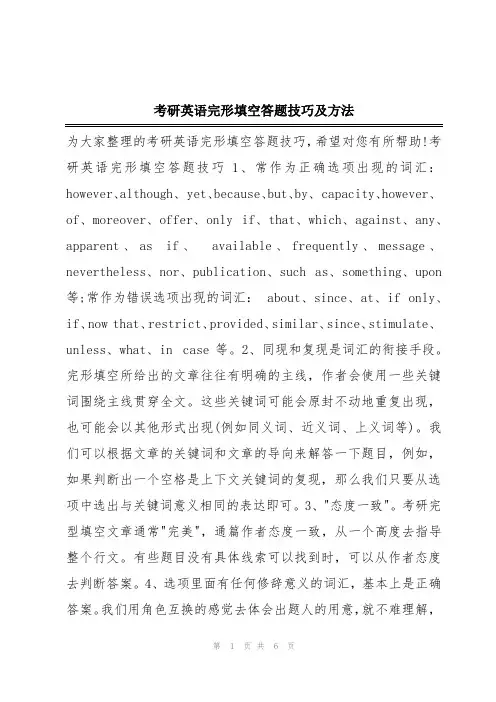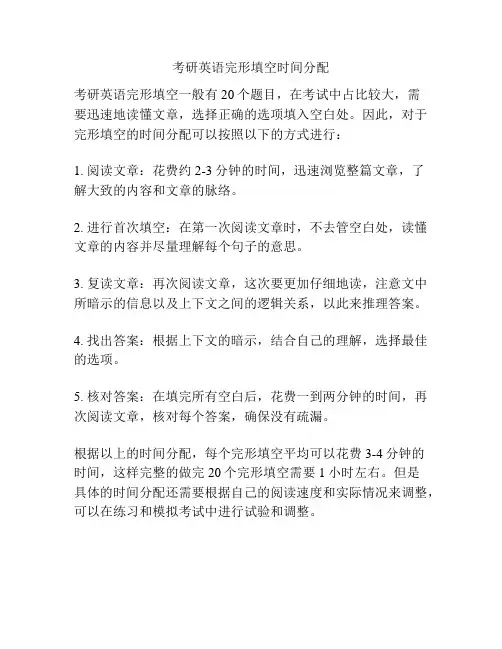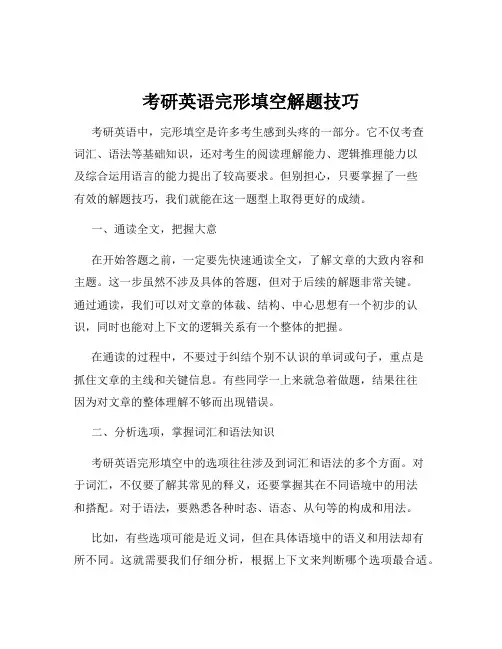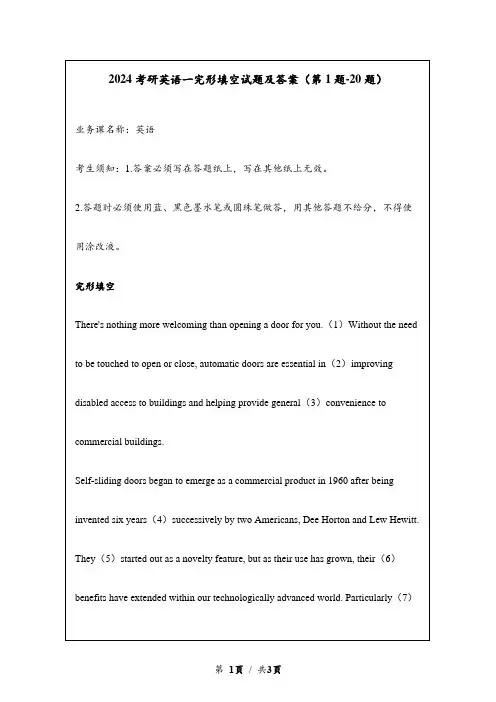考研英语完形填空
考研英语完形填空答题技巧及方法

考研英语完形填空答题技巧及方法为大家整理的考研英语完形填空答题技巧,希望对您有所帮助!考研英语完形填空答题技巧1、常作为正确选项出现的词汇:however、although、 yet、because、but、by、 capacity、however、of、moreover、offer、only if、that、which、against、any、apparent、as if、available、frequently、message、nevertheless、nor、publication、such as、something、upon 等;常作为错误选项出现的词汇: about、since、at、if only、if、now that、restrict、provided、similar、since、stimulate、unless、what、in case等。
2、同现和复现是词汇的衔接手段。
完形填空所给出的文章往往有明确的主线,作者会使用一些关键词围绕主线贯穿全文。
这些关键词可能会原封不动地重复出现,也可能会以其他形式出现(例如同义词、近义词、上义词等)。
我们可以根据文章的关键词和文章的导向来解答一下题目,例如,如果判断出一个空格是上下文关键词的复现,那么我们只要从选项中选出与关键词意义相同的表达即可。
3、"态度一致"。
考研完型填空文章通常"完美",通篇作者态度一致,从一个高度去指导整个行文。
有些题目没有具体线索可以找到时,可以从作者态度去判断答案。
4、选项里面有任何修辞意义的词汇,基本上是正确答案。
我们用角色互换的感觉去体会出题人的用意,就不难理解,即可确认答案也可做验证。
同时,考生们也可积极寻找和思考其他没有出题处的类似情况。
5、如出现陌生的选项词汇,这里注意,两个原则,选择相对简单的词汇,不要选择偏的怪的词汇。
6、选项特点。
绝对同义选项两个都错:11%的分数,也就是1.1分;相对同义选项,也就是约等于选项,这就是出题点或是题眼,细微的差别就是考试的考点;二选一,其中一个必须对:18%的分数,也就是1.8分。
考研英语完形填空时间分配

考研英语完形填空时间分配
考研英语完形填空一般有20个题目,在考试中占比较大,需
要迅速地读懂文章,选择正确的选项填入空白处。
因此,对于完形填空的时间分配可以按照以下的方式进行:
1. 阅读文章:花费约2-3分钟的时间,迅速浏览整篇文章,了
解大致的内容和文章的脉络。
2. 进行首次填空:在第一次阅读文章时,不去管空白处,读懂文章的内容并尽量理解每个句子的意思。
3. 复读文章:再次阅读文章,这次要更加仔细地读,注意文中所暗示的信息以及上下文之间的逻辑关系,以此来推理答案。
4. 找出答案:根据上下文的暗示,结合自己的理解,选择最佳的选项。
5. 核对答案:在填完所有空白后,花费一到两分钟的时间,再次阅读文章,核对每个答案,确保没有疏漏。
根据以上的时间分配,每个完形填空平均可以花费3-4分钟的
时间,这样完整的做完20个完形填空需要1小时左右。
但是
具体的时间分配还需要根据自己的阅读速度和实际情况来调整,可以在练习和模拟考试中进行试验和调整。
考研英语 完形填空

考研英语完形填空English:"In the realm of academic pursuits, the Graduate Record Examination (GRE) stands as a significant milestone for aspiring graduate students. This standardized test evaluates an individual's readiness for graduate-level education across various disciplines. While the GRE General Test assesses verbal reasoning, quantitative reasoning, and analytical writing skills, subject-specific GRE tests delve deeper into specific fields of study. The GRE's prominence lies in its role as a common measure for admission into graduate programs worldwide, offering universities a standardized tool to evaluate applicants' aptitude and potential. Its wide acceptance underscores its importance, making adequate preparation essential for prospective candidates. From honing analytical skills to mastering complex problem-solving, diligent preparation is crucial to excel in the GRE and secure admission to esteemed graduate programs."中文翻译:"在学术追求的领域中,研究生入学考试(GRE)是渴望攀登研究生阶梯的重要里程碑。
2024年考研英语二完形填空

2024年考研英语二完形填空(中英文版)英文:The reading comprehension section in the English Part II of the 2024 Postgraduate Entrance Examination is a challenging task that tests students" ability to understand the context and implications of a given text.This part usually consists of a short passage followed by a series of questions, which require candidates to fill in the blanks with the most appropriate words or phrases.To excel in this section, students need to develop skills such as rapid reading, vocabulary expansion, and logical reasoning.中文:2024年考研英语二的阅读理解部分是一个挑战性的任务,它测试学生理解给定文本的上下文和含义的能力。
这部分通常由一篇短文和一系列问题组成,要求考生用最合适的单词或短语填空。
要在这一部分取得优异成绩,学生需要培养快速阅读、词汇扩展和逻辑推理等技能。
英文:In recent years, due to the increasing number of candidates and the fierce competition, the difficulty of the English Part II has been gradually raised.Therefore, it is essential for students to start preparing early, not only by studying the required textbooks but also by reading more English articles and practicing with past examination papers.By doing so, theycan familiarize themselves with the question types and improve their reading speed and accuracy.中文:近年来,由于考生人数的增加和竞争的激烈,英语二部分的难度逐渐提高。
考研英语完形填空解题技巧

考研英语完形填空解题技巧考研英语中,完形填空是许多考生感到头疼的一部分。
它不仅考查词汇、语法等基础知识,还对考生的阅读理解能力、逻辑推理能力以及综合运用语言的能力提出了较高要求。
但别担心,只要掌握了一些有效的解题技巧,我们就能在这一题型上取得更好的成绩。
一、通读全文,把握大意在开始答题之前,一定要先快速通读全文,了解文章的大致内容和主题。
这一步虽然不涉及具体的答题,但对于后续的解题非常关键。
通过通读,我们可以对文章的体裁、结构、中心思想有一个初步的认识,同时也能对上下文的逻辑关系有一个整体的把握。
在通读的过程中,不要过于纠结个别不认识的单词或句子,重点是抓住文章的主线和关键信息。
有些同学一上来就急着做题,结果往往因为对文章的整体理解不够而出现错误。
二、分析选项,掌握词汇和语法知识考研英语完形填空中的选项往往涉及到词汇和语法的多个方面。
对于词汇,不仅要了解其常见的释义,还要掌握其在不同语境中的用法和搭配。
对于语法,要熟悉各种时态、语态、从句等的构成和用法。
比如,有些选项可能是近义词,但在具体语境中的语义和用法却有所不同。
这就需要我们仔细分析,根据上下文来判断哪个选项最合适。
再比如,一些选项考查的是固定的语法结构或短语,如果我们对这些知识掌握不牢固,就很容易出错。
三、利用上下文线索上下文线索是解答完形填空题的重要依据。
很多时候,答案就隐藏在文章的前后文之中。
我们要注意寻找与空格相关的词汇、短语或句子,通过它们来推断出空格处应填的内容。
例如,如果前文提到了“in the past”,那么后面出现的空格很可能需要一个与过去时态相关的动词。
再比如,如果空格前出现了“and”,那么空格处的词汇很可能与前面的词汇在词性、词义或形式上保持一致。
四、注意逻辑关系文章中的逻辑关系对于解题也非常重要。
常见的逻辑关系有因果关系、转折关系、并列关系、递进关系等。
通过分析这些逻辑关系,我们可以更准确地理解文章的意思,从而做出正确的选择。
2024考研英语一完形填空试题及答案(第1题-20题)

2024考研英语一完形填空试题及答案(第1题-20题)业务课名称:英语考生须知:1.答案必须写在答题纸上,写在其他纸上无效。
2.答题时必须使用蓝、黑色墨水笔或圆珠笔做答,用其他答题不给分,不得使用涂改液。
完形填空There's nothing more welcoming than opening a door for you.(1)Without the need to be touched to open or close, automatic doors are essential in(2)improving disabled access to buildings and helping provide general(3)convenience to commercial buildings.Self-sliding doors began to emerge as a commercial product in 1960 after being invented six years(4)successively by two Americans, Dee Horton and Lew Hewitt. They(5)started out as a novelty feature, but as their use has grown, their(6)benefits have extended within our technologically advanced world. Particularly(7)useful in busy locations and during times of emergency, the doors(8)act as crowd management by reducing the obstacles put in people's way.(9)As well as making access both in and out of buildings easier for people, the difference in the way many of these doors open helps to reduce the total area(10). occupied by them. Automatic doors often open to the side, with the panels sliding across one another. Replacing swing doors, these(11)allow smaller spaces to maximise the usable space inside without having to(12)clear the way for a large, sticking-out door. There are many different types of automatic door, with each(13)relying on specific signals to tell them when to open.(14)Although these methods differ, the main(15)principles remain the same.Each automatic door system(16)analyses the light, sound, weight, or movement in their vicinity as a signal. Sensor-types are chosen to(17)compare the different environments they are needed in.(18)For example, a busy road might not(19)suit a motion-sensored door, as it would constantly be opening for passers-by. A pressure-sensitive mat would be more(20)appropriate to limit the surveyed area.答案:1-10题:DCBAB CADAD 11-20题:ACCDC BDCBA。
考研英语完型填空解题技巧
考研英语完型填空解题技巧推荐文章英语完型填空的解题技巧 热度: 七年级英语完形填空解题技巧 热度: 中考英语完形填空解题技巧 热度: 职称英语完形填空解题技巧 热度: 考研英语完型填空解题方法 热度:完形填空是考研英语中的一道大题,知道该怎么解答它,我们就能够拿到更多的分。
下面是店铺给大家整理的考研英语完型填空解题技巧,供大家参阅!考研英语完型填空解题技巧目标:6分到7分. 完型4分技巧: 和英语水平无关。
红花绿叶原则,1. 红花词汇(必选的单词) however although yet because2. 绿叶词汇(必不选的单词)① since(家族都不选) even since ,now that,what.② 涉及虚拟语气的词汇(表示与现实相反或不相符的情况) if o nly 但愿. 与过去相反,从句过去完成 与现在相反,一般过去时 与将来情况相反 would/could+v 所以用if only 最少是过去时.一般在文中很少选择,in否则要不然)case(唯恐,万一以免),lest,or else.(③ 表示关于的词 as to,with regard to,about,with︱in reference to,3. 2-5道红花绿叶词汇.概率原则:1. 每篇完形填空中,A,B,C,D作为正确选项的个数在4-6之间。
2. A选项出现的次数最多,蒙一水的A。
3. 没有连续三个答案都一样的情况。
连续两个答案都连在一起的答案0-3.相邻答案都不一样的概率17-20.4. 五组答案中至少要出现3个字母作为正确选项,每组接缝处没有连续两个答案是一样的情况。
5. 阅读理解也有此规律。
,我拼搏我自信,大学毕业生的精神家园!4-7分技巧:同义原则:1. 四个选项中两个或三个实词(名、动、形、副)互为同义时,答案往往在其中。
2. 四个选项中当两个或三个虚词互为同义词是往往都不选,介词,连词,感叹词。
3. 当四个选项有一个共同的意思时,该意思往往不能被选。
考研英语完形填空备考方法及技巧
考研英语完形填空备考方法及技巧考研英语完形填空备考方法及技巧考研英语完形填空部分是考察考生对英语语言综合运用能力的一项重要测试。
为了帮助考生更好地备考完形填空,提高答题效果,本文将介绍一些备考方法及技巧。
一、养成良好的阅读习惯良好的阅读能力是解决完形填空的基础。
考生应坚持每天阅读英语材料,包括英文报纸、英文小说、英文杂志等。
通过大量的阅读培养对词汇、句子结构、语境等的敏感度。
二、积累词汇和短语完形填空涉及大量的词汇和短语。
考生应通过词汇书、单词APP等形式积累并记忆常见的词汇和短语。
同时,要了解词汇的各种词性、派生词、词义辨析等,以便能够正确使用这些词汇。
三、注意上下文逻辑关系在完形填空的过程中,考生不仅需要理解每个空格前后的句子,还需要判断这两句之间的逻辑关系。
英语中常用的逻辑关系词包括转折关系、因果关系、条件关系等。
考生可以通过平时的阅读积累,提高对上下文逻辑关系的判断能力。
四、注意句子结构和语法完形填空中,往往会出现各种句子结构和语法现象。
考生需要熟悉英语中常见的语法规则,并能够准确地判断出句子中的主谓宾结构、从句结构、时态、语态等。
只有对句子结构和语法规则有较好的掌握,才能更准确地选择答案。
五、练习真题和模拟试题做完形填空题只有学了不如练了。
考生可以通过练习真题和模拟试题,来熟悉考试的题型和难度,逐步提高解题能力和答题速度。
在练习过程中,考生要注意总结错题原因,找出自己的弱点,有针对性地进行复习和训练。
六、注意时间管理完形填空是考试时间比较紧张的一个部分,考生要学会合理安排时间。
在模拟考试过程中,可以尝试设定时间限制,锻炼解题的速度和抓紧时间的能力。
同时,对于一些难题,要学会放弃,不要在一道题上花太多时间。
总结起来,备考完形填空需要考生多读、多练、多积累。
良好的阅读习惯、词汇和短语积累、注意上下文逻辑关系、熟悉句子结构和语法、练习真题和模拟试题、合理时间管理,这些方法和技巧的综合运用将有助于提高考生在考研英语完形填空中的应试能力。
考研英语完形填空做题技巧
考研英语完形填空做题技巧1. 嘿,先别急着做题呀!你得像侦探一样去分析文章的上下文,这可太重要啦!比如说,有个空前后都在说开心的事儿,那这个空大概率也得是个积极的词呀。
就像你找东西,得根据周围的线索来嘛!2. 哎呀,千万别忘了固定搭配呀!那简直就是送分题呀。
比如“take into account”,一旦看到,就赶紧选呀,别犹豫!这就好比你知道钥匙能开锁,直接用就对啦!3. 注意逻辑关系呀!这就像走迷宫,得顺着正确的路走。
要是前面说不好,后面说好了,那中间的空肯定得是个转折词呀。
就像你本来在走下坡路,突然就上坡了,中间肯定有个转折点嘛!4. 做题的时候要像老鹰一样敏锐呀!看到那些高频词,就得特别留意。
比如说“however”经常出现,那它周围的空你就得好好琢磨琢磨。
这就像你总遇到一个熟人,肯定对他印象深刻呀!5. 哎呀呀,别小瞧那些简单的词呀!有时候最普通的反而最关键。
比如“and”,它连接的前后可能就有大文章呢。
就像链条上的一环,虽小但不可或缺呀!6. 你们知道吗?理解文章的主旨就像抓住了主线,做题才能顺顺当当。
如果文章讲的是环保,那相关的词出现的概率就很大呀。
这跟你知道了故事的主题,就能猜到情节发展一样!7. 做题速度也别太慢啦!但也不能瞎蒙呀。
就像跑步,得保持节奏。
你不能慢悠悠走,也不能乱冲,得稳稳地来。
不然怎么能拿高分呢?8. 记得要多积累词汇呀!这就像给自己的武器库添装备。
词汇量大了,做题就轻松多啦。
就像战士有了好武器,打仗都更有底气呀!9. 可别死磕一个空呀!那多浪费时间呀。
不行就先跳过,回头再来看。
就像路上遇到个大石头,绕过去呗,等有办法了再来解决。
10. 总之呀,考研英语完形填空就是一场战斗,要策略得当,才能大获全胜呀!加油吧!。
考研英语完形填空的时间分配
考研英语完形填空的时间分配
考研英语完形填空部分通常有20个左右的空格,时间限制为
15分钟。
根据这个时间限制,可以将时间分配如下:
1. 熟悉文章(1分钟)- 花费1分钟左右快速阅读完形填空文章,了解大意和文章的主题。
2. 逐空答题(12分钟)- 平均每个空格花费约35-40秒的时间,先从阅读理解进行逐个空格的填写。
可以扫描文章段落,找到线索,根据上下文和语法规则进行推断和判断。
如果某个空格无法确定答案,可以选择先跳过并在最后的时间内回来处理。
3. 校对答案(2分钟)- 在剩下的时间内,回头检查答案,确
保填写的词语符合语法和句意。
同时留出时间来处理跳过的空格,并选择最合适的答案填写。
4. 复印答题卡(1分钟)- 检查答题卡是否填写完整,复印一
份用于备份。
这样的时间分配可以帮助考生更好地掌握时间,提高准确性。
但每个人的情况不同,可能需要根据个人的经验和实际情况进行调整。
最重要的是在实践中进行练习和调整,逐渐找到适合自己的时间分配策略。
- 1、下载文档前请自行甄别文档内容的完整性,平台不提供额外的编辑、内容补充、找答案等附加服务。
- 2、"仅部分预览"的文档,不可在线预览部分如存在完整性等问题,可反馈申请退款(可完整预览的文档不适用该条件!)。
- 3、如文档侵犯您的权益,请联系客服反馈,我们会尽快为您处理(人工客服工作时间:9:00-18:30)。
1986年全国硕士研究生入学统一考试英语试题On Wednesday afternoons Annie took the bus into town to shop in the market. For an hour or __16__ she would walk up and down between the stalls looking at everything, buying here and there, and __17__ a sharp lookout for the bargains that were sometimes to be had. And then, with all the things she needed __18__ she would leave the market for the streets of the town to spend another hour __19__ she liked best: looking in furniture shop windows.One Wednesday she found a new shop full of the most delightful things, with a notice inviting anyone to walk in and look __20__ without feeling they had to buy something. Annie hesitated for a moment before stepping through the doorway where, almost at once, she stopped __21__ before a green armchair. There was a card on the chair which said: “This fine chair is yours __22__ less than a pound a week,” and very small at the bottom, “Cash price eighty-nine pounds fifty.” A pound a week... __23__, she could almost pay that out of her housekeeping money and never miss it! A voice at her shoulder made her __24__. “Can I help you, Madam?”She looked round at the assistant who had come softly to her __25__.“Oh, well, no,” she said. “I was just looking.”“We’ve chairs of all kinds in the showroom. If you’ll just come up, you will find something to suit you.”Annie, worried at the thought of being persuaded to buy something she didn’t need, left the shop hurriedly.16. [A] so [B] more [C] else [D] another17. [A] taking [B] making [C] fixing [D] keeping18. [A] buy [B] bought [C] buying [D] to have bought19. [A] in a way [B] by the way [C] in the way [D] on the way20. [A] behind [B] round [C] back [D] on21. [A] doubted [B] wondered [C] puzzled [D] delighted22. [A] at [B] for [C] with [D] in23. [A] Why [B] When [C] How [D] What24. [A] jump [B] leap [C] laugh [D] wonder25. [A] place [B] back [ C] side [D] front1987年全国硕士研究生入学统一考试英语试题Cheques have __36__ replaced money as a means of exchange for they are widely accepted everywhere. Though this is very convenient for both buyer and seller, it should not be forgotten that cheques are not real money: they are quite valueless in themselves. A shop-keeper always runs a certain __37__ when he accepts a cheques and he is quite __38__ his rights if on occasion, he refuses to do so.People do not always know this and are shocked if their good faith is called __39__. An old and very wealthy friend of mine told me he had an extremely unpleasant experience. He went to a famous jewelry shop which keeps a large __40__ of precious stones and asked to be shown some pearl necklaces. After examining several trays, he decided to buy a particularly fine string of pearls and asked if he could pay by Cheques. The assistant said that this was quite __41__ but the moment my friend signed his name, he was invited into the manager’s office.The manager was very polite, but he explained that someone with exactly the same name had presented them with a worthless Cheque not long ago. My friend got very angry when he heard this and said he would buy a necklace somewhere else. When he got up to go, the manager told him that the police would arrive at any moment and he had better stay __42__ the wanted to get into serious trouble. __43__, the police arrived soon afterwards. They apologized to my friend for the __44__, but explained that a person who had used the same name as his was responsible for a number of recent robberies. Then the police asked my friend to copy out a note which had been used by the thief in a number of shops. The note __45__: “gun in my pocket. Ask no questions and give me al l the money in the safe.” Fortunately, my friend’s handwriting was quite unlike the thief’s. He was not only allowed to go without further delay, but to take the string of pearls with him.36. [A] exactly [B] really [C] largely[D] thoroughly37. [A] danger [B] chance [C] risk[D] opportunity38. [A] within [B] beyond [C] without[D] out of39. [A] in difficulty [B] in doubt [C] in earnest[D] in question40. [A] amount [B] stock [C] number[D] store41. [A] in order [B] in need [C] in use[D] in common42. [A] whether [B] if [C] otherwise[D] unless43. [A] Really [B] Sure enough [C] Certainly[D] However44. [A] treatment [B] manner [C] inconvenience[D] behaviour45. [A] read [B] told [C] wrote[D] informed1988年全国硕士研究生入学统一考试英语试题One day drought may be a thing of the past at least in coastal cities. Vast areas of desert throughout the world may for the first time __26__ and provide millions of hectares of land where now nothing grows.By the end of this century this may not be mere __27__. Scientists are already looking into the possibility of using some of the available ice in the Arctic and Antarctic. In these regions there are vast ice-caps formed by snow that has fallen over the past 50,000 years. Layer __28__ layer of deep snow means that, when melted, the snow water would be pure, not salty as sea-ice would be. There is so much __29__ pure water here that it would need only a fraction of it to turn much of the desert or poorly irrigated parts of the world into rich farmland. And what useful packages it would come in! It should be possible to cut off a bit of ice and transport it! Alternatively perhaps a passing iceberg could be __30__. They are always breaking away from the main caps and floating around, pushed by currents, until they eventually melt and are wasted.Many icebergs are, of course, far too small to be towed __31__ distance, and would melt before they reached a country that needed them anywhere. It would be necessary to locate one that was __32__ and that was big enough to provide a good supply of ice when it reached us. Engineers think that an iceberg up to seven milesbig as a supertanker! Even then they would cover only twenty miles every day. However, __33__ the iceberg was at its destination, more that 7,000 million cubic metres of water could be taken from it! That would probably be more than enough for any medium-sized city even in the hottest summer! But no doubt a use could be found for it. __34__, scientist say, there would not be too much wastage in such a journey. The larger the iceberg, the slower it melts, even if it is towed through the tropics. This is because when the sun has a bigger area to warm __35__, less heat actually gets into the iceberg. The vast frozen centre would be unaffected.26. [A] come to life [B] come into existence [C] come into activity[D] come round27. [A] speculation [B] imagination [C] computation[D] expectation28. [A] above [B] of [C] upon[D] over29. [A] essential [B] potential [C] claimable[D] obtainable30. [A] seized [B] snatched [C] grabbed[D] captured31. [A] much [B] any [C] some[D] certain32. [A] manageable [B] manipulative [C] operable[D] controllable33. [A] after [B] while [C] since[D] once34. [A] Apparently [B] Noticeably [C] Distinctly[D] Notably35. [A] round [B] over [C] up[D] through1989年全国硕士研究生入学统一考试英语试题One day drought may be a thing of the past at least in coastal cities. Vast areas of desert throughout the world may for the first time __26__ and provide millions of hectares of land where now nothing grows.By the end of this century this may not be mere __27__. Scientists are already looking into the possibility of using some of the available ice in the Arctic and Antarctic. In these regions there are vast ice-caps formed by snow that has fallen over the past 50,000 years. Layer __28__ layer of deep snow means that, when melted, the snow water would be pure, not salty as sea-ice would be. There is so much __29__ pure water here that it would need only a fraction of it to turn much of the desert or poorly irrigated parts of the world into rich farmland. And what useful packages it would come in! It should be possible to cut off a bit of ice and transport it! Alternatively perhaps a passing iceberg could be __30__. They are always breaking away from the main caps and floating around, pushed by currents, until they eventually melt and are wasted.Many icebergs are, of course, far too small to be towed __31__ distance, and would melt before they reached a country that needed them anywhere. It would be necessary to locate one that was __32__ and that was big enough to provide a good supply of ice when it reached us. Engineers think that an iceberg up to seven miles long and one and a half miles wide could be transported if the tug pulling it was as big as a supertanker! Even then they would cover only twenty miles every day. However, __33__ the iceberg was at its destination, more that 7,000 million cubic metres of water could be taken from it! That would probably be more than enough for any medium-sized city even in the hottest summer! But no doubt a use could be found for it. __34__, scientist say, there would not be too much wastage in such a journey. The larger the iceberg, the slower it melts, even if it is towed through the tropics. This is because when the sun has a bigger area to warm __35__, less heat actually gets into the iceberg. The vast frozen centre would be unaffected.26. [A] come to life [B] come into existence[C] come into activity[D] come round27. [A] speculation [B] imagination [C] computation[D] expectation28. [A] above [B] of [C] upon[D] over29. [A] essential [B] potential [C] claimable[D] obtainable30. [A] seized [B] snatched [C] grabbed[D] captured31. [A] much [B] any [C] some[D] certain32. [A] manageable [B] manipulative [C] operable[D] controllable33. [A] after [B] while [C] since[D] once34. [A] Apparently [B] Noticeably [C] Distinctly[D] Notably35. [A] round [B] over [C] up[D] through。
